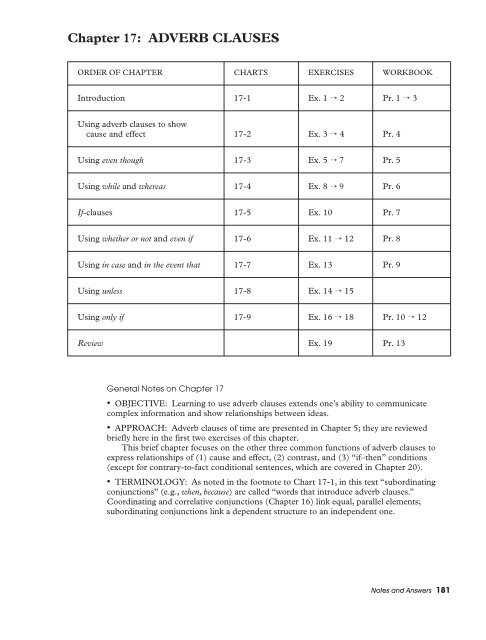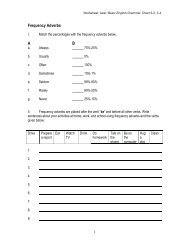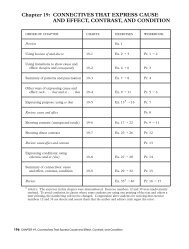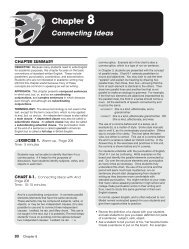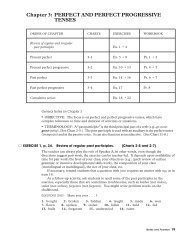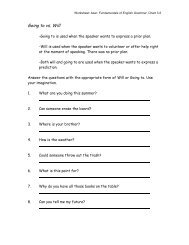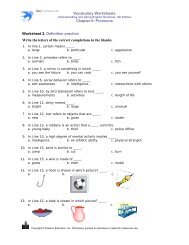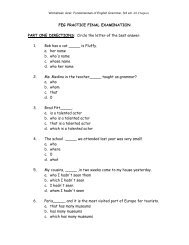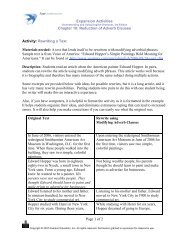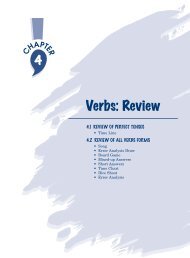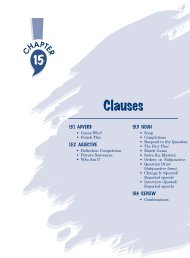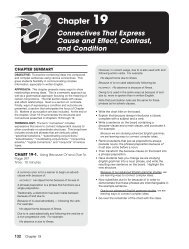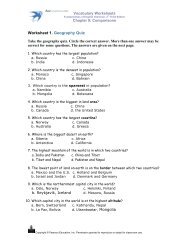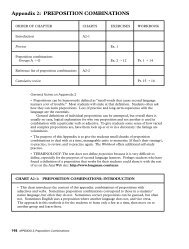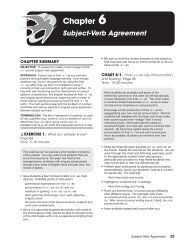Chapter 17: ADVERB CLAUSES - AzarGrammar.com
Chapter 17: ADVERB CLAUSES - AzarGrammar.com
Chapter 17: ADVERB CLAUSES - AzarGrammar.com
Create successful ePaper yourself
Turn your PDF publications into a flip-book with our unique Google optimized e-Paper software.
<strong>Chapter</strong> <strong>17</strong>: <strong>ADVERB</strong> <strong>CLAUSES</strong>ORDER OF CHAPTER CHARTS EXERCISES WORKBOOKIntroduction <strong>17</strong>-1 Ex. 1 → 2 Pr. 1 → 3Using adverb clauses to showcause and effect <strong>17</strong>-2 Ex. 3 → 4 Pr. 4Using even though <strong>17</strong>-3 Ex. 5 → 7 Pr. 5Using while and whereas <strong>17</strong>-4 Ex. 8 → 9 Pr. 6If-clauses <strong>17</strong>-5 Ex. 10 Pr. 7Using whether or not and even if <strong>17</strong>-6 Ex. 11 → 12 Pr. 8Using in case and in the event that <strong>17</strong>-7 Ex. 13 Pr. 9Using unless <strong>17</strong>-8 Ex. 14 → 15Using only if <strong>17</strong>-9 Ex. 16 → 18 Pr. 10 → 12Review Ex. 19 Pr. 13General Notes on <strong>Chapter</strong> <strong>17</strong>• OBJECTIVE: Learning to use adverb clauses extends one’s ability to <strong>com</strong>municate<strong>com</strong>plex information and show relationships between ideas.• APPROACH: Adverb clauses of time are presented in <strong>Chapter</strong> 5; they are reviewedbriefly here in the first two exercises of this chapter.This brief chapter focuses on the other three <strong>com</strong>mon functions of adverb clauses toexpress relationships of (1) cause and effect, (2) contrast, and (3) “if–then” conditions(except for contrary-to-fact conditional sentences, which are covered in <strong>Chapter</strong> 20).• TERMINOLOGY: As noted in the footnote to Chart <strong>17</strong>-1, in this text “subordinatingconjunctions” (e.g., when, because) are called “words that introduce adverb clauses.”Coordinating and correlative conjunctions (<strong>Chapter</strong> 16) link equal, parallel elements;subordinating conjunctions link a dependent structure to an independent one.Notes and Answers 181
CHART <strong>17</strong>-1:INTRODUCTION• Students have learned about two other kinds of dependent clauses: adjective clauses(<strong>Chapter</strong> 13) and noun clauses (<strong>Chapter</strong> 12). You might review the characteristics ofdependent clauses: they must contain a subject + a verb; they cannot stand alone as asentence.• In<strong>com</strong>plete sentences consisting of a solo adverb clause are a <strong>com</strong>mon problem in studentwriting. INCORRECT: He went to bed. Because he was sleepy. However, such in<strong>com</strong>pletesentences are <strong>com</strong>mon in conversation in response to a why-question:A: Why did he go to bed?B: Because he was sleepy. EXERCISE 1, p. 360. Adverb clauses. (Chart <strong>17</strong>-1)Give students time to add punctuation in their books. Then lead a quick run-through ofthe items, or have pairs of students <strong>com</strong>pare their work.Many of the items in this exercise require an understanding of the uses of periodsand <strong>com</strong>mas as presented in <strong>Chapter</strong> 16 (Coordinating Conjunctions). Items 12 and 13contain incidental material covered in <strong>Chapter</strong>s 12 (Noun Clauses) and 13 (AdjectiveClauses).Items 5–9 are related to the picture.ANSWERS: [The adverb clauses are underlined.]2. When it began to rain, he closed the windows. 3. He closed the windows when itbegan to rain. 4. As soon as the rain began, the children wanted to go outdoors. Theylove to play outside in the warm summer rain. I used to do the same thing when I was achild. 5. Jack got to the airport early. After he checked in at the airline counter, he wentto the waiting area near his gate. He sat and read until his flight was announced.6. Jack walked onto the plane, found his seat, and stowed his bag in an overhead<strong>com</strong>partment. 7. Before the plane took off, he fastened his seat belt and put his seatin an upright position. 8. Jack’s wife doesn’t like to fly because she gets nervous onairplanes. 9. When Jack and his wife go on vacation, they have to drive or take the trainbecause his wife is afraid of flying. 10. I had a cup of tea before I left for work thismorning, but I didn’t have anything to eat. I rarely eat breakfast. 11. After Ellen getshome from work, she likes to read the newspaper. She follows the same routine every dayafter work. As soon as she gets home, she changes her clothes, gets a snack and a drink,and sits down in her favorite chair to read the newspaper in peace and quiet. She usuallyhas about half an hour to read the paper before her husband arrives home from his job.12. When you speak to someone [who is hard of hearing = adjective clause], you do not haveto shout. It is important to face the person directly and speak clearly. My elderly father ishard of hearing, but he can understand me if I face him, speak slowly, and say each wordclearly. 13. Greg Adams has been blind since he was two years old. Today he is a key scientistin a <strong>com</strong>puter <strong>com</strong>pany. He is able to design <strong>com</strong>plex electronic equipment becausehe has a special <strong>com</strong>puter [that reads, writes, and speaks out loud = adjective clause]. Hisblindness neither helps nor hinders him. It is irrelevant to [how well he does his job = nounclause]. EXERCISE 2, p. 361. Review of adverb clauses of time. (<strong>Chapter</strong> 5 and Chart <strong>17</strong>-1)This can be done as seatwork while you walk around the classroom and offer help, or itcould be assigned as homework. It could also be done orally. One of the challenges of thisexercise is appropriate verb tense usage.182 CHAPTER <strong>17</strong>, Adverb Clauses
SAMPLE COMPLETIONS: 1. Since I came to this city, I’ve met a lot of nice people.2. Just as I was falling asleep last night, a mosquito buzzed in my ear and woke me up.3. I’ll help you with your homework as soon as I finish washing the dishes. 4. I was late.By the time I got to the airport, my plane had already taken off. 5. One of my friendsgets nervous every time she has to perform in public. 6. I will be here until I have<strong>com</strong>pleted my education. 7. I will remember my wedding day as long as I live.8. I heard the phone ring while I was in the shower. 9. Once summer <strong>com</strong>es, the trafficon the highway be<strong>com</strong>es heavier. 10. Shortly before I put supper on the table, the catdemanded to be fed. 11. I have been in this city for three years. By the time I leave,I will be able to speak English fluently. 12. The last time I was with my family, I was 24years old. 13. The next time you see them, you’ll be 28. 14. I will be with you justas soon as I finish checking this inventory. 15. Not long after I bought the car, I ranover a nail and got a flat tire. 16. I had already finished supper when you telephoned.<strong>17</strong>. Whenever I’m late for an important meeting, I get nervous. 18. Ever since I was achild, I’ve been afraid of snakes.CHART <strong>17</strong>-2:USING <strong>ADVERB</strong> <strong>CLAUSES</strong> TO SHOW CAUSEAND EFFECT• There are differences among the ways to say “because.” Because makes the most direct orexplicit cause-and-effect statement. Since means “because it is a fact that” or “seeing that it istrue that.” For example: Since you’ve done this before (a known fact), could you please show mehow? Because, but not since, can ask about an unknown cause. For example: Did he stay homebecause he was tired? Now that is special to present-time, known reasons. It indicates that asituation has changed.• Punctuation follows the same guidelines with these adverb clauses as with others. (And theyare only guidelines, not rules. There are wide stylistic variations in <strong>com</strong>ma usage with adverbclauses. This text simply presents the most usual patterns.)• Other cause-and-effect subordinating conjunctions you may wish to introduce in anadvanced class are as, as/so long as, and inasmuch as. They are similar to since: they express acause that is a known fact.As has many uses. Students might be interested in knowing that one use is to expresscause and effect. In their own writing, however, they might prefer to use because, since, or nowthat in order to ensure clarity.Inasmuch as is generally found only in formal writing and is relatively infrequent. EXERCISE 3, p. 362. Using adverb clauses to show cause and effect. (Chart <strong>17</strong>-2)You might ask for two different versions of the response to a few items to show the use of a<strong>com</strong>ma whenever the adverb clause precedes the independent clause.ANSWERS: [The adverb clauses are underlined.]3. Cold air hovers near the earth because it is heavier than hot air. 4. Since you paidfor the theater tickets, please let me pay for our dinner. 5. Now that Larry is finallycaught up on his work, he can start his vacation tomorrow. [be caught up on = have no tasks leftto do] 6. Because our TV set was broken, we listened to the news on the radio.7. My brother got married last month. Now that he’s a married man, he has moreresponsibilities. 8. Since oil is an irreplaceable natural resource, we must do whateverwe can in order to conserve it. 9. Do you want to go for a walk now that the rain hasstopped? 10. Many young people move to the cities in search of employment sinceNotes and Answers 183
there are few jobs available in the rural areas. 11. Now that the civil war has ended, anew government is being formed. 12. Since ninety-two thousand people already havereservations with an airline <strong>com</strong>pany for a trip to the moon, I doubt that I’ll get the chanceto go on one of the first tourist flights. EXERCISE 4, p. 363. Using adverb clauses to show cause and effect. (Chart <strong>17</strong>-2)SAMPLE COMPLETIONS: [The adverb clauses are underlined.]1. Now that I’ve finally finished cleaning my room, I can watch TV. 2. The teacherdidn’t collect the papers because the exercise is not going to be graded. 3. Since it’s tooexpensive to fly across the country, we are going by bus. 4. Jack can’t stay out all nightwith his friends now that he is working the night shift. 5. Since we don’t have classtomorrow, we can stay up later tonight.CHART <strong>17</strong>-3:EXPRESSING CONTRAST (UNEXPECTED RESULT):USING EVEN THOUGH• The general category of “contrast” is defined as “unexpected result” here to help thestudents <strong>com</strong>pare because and even though, and also to help them understand the meaning ofcontrast (i.e., that something is in some way different from something else) as the term is usedin the text.• Other forms of even though are although and though. (See Chart 19-6.) The differences arenegligible. EXERCISE 5, p. 364. Using EVEN THOUGH. (Chart <strong>17</strong>-3)Compare the related pairs of sentences: 1 and 2, 3 and 4, 5 and 6, and 7 and 8. Give studentsa chance to <strong>com</strong>prehend the information in both sentences before discussing them.ANSWERS: 3. even though 4. because 5. Even though 6. Because7. even though 8. because 9. even though 10. even though 11. because12. Even though . . . because EXERCISE 6, p. 364. Using EVEN THOUGH. (Chart <strong>17</strong>-3)Before responding, the students need a moment to decide whether the “truthful” answer isYes or No. Then they must construct a <strong>com</strong>plete sentence. The result is a fairly realisticdialogue. You can easily assume the role of Speaker A, but in a large class, group work maybe preferable.ANSWERS: [The adverb clause can <strong>com</strong>e before or after the main clause.]1. Yes, even though I wasn’t tired, I went to bed. [Anyway is similar in meaning to eventhough, showing an unexpected result.] 2. No, ( . . . ) didn’t wake up even though thetelephone rang many times. 3. Yes, even though the food was terrible, I ate it.4. Yes, even though I didn’t study, I passed the test. 5. No, I didn’t say home eventhough the weather is terrible (today). 6. No, even though I fell down the stairs, I didn’tget hurt. 7. Yes, I still feel tired even though I took a nap. [took a nap = slept for a shorttime during the day] 8. No, even though I told the truth, no one believed me. 9. Yes,even though I turned on the air conditioner, it’s still hot in here. 10. No, even though Imailed the letter three days ago, it still hasn’t arrived/it hasn’t arrived yet. 11. No, I184 CHAPTER <strong>17</strong>, Adverb Clauses
CHART <strong>17</strong>-5:EXPRESSING CONDITIONS IN <strong>ADVERB</strong> <strong>CLAUSES</strong>:IF-<strong>CLAUSES</strong>• As with adverb clauses of time (see <strong>Chapter</strong> 5), it is incorrect to use the future tense (i.e.,will / be going to) in an if-clause. An exception, however, occurs when the speaker is trying toarrange an exchange of promises: If you’ll do it, I’ll do it.• All of the examples and exercise items in this unit on “condition” (<strong>17</strong>-5 through <strong>17</strong>-9) arein present or future time. <strong>Chapter</strong> 20 picks up the use of other verb forms in conditionalsentences. EXERCISE 10, p. 367. IF-clauses. (Chart <strong>17</strong>-5)Several students could give answers for each item. Encourage them to be creative orhumorous. The main point is to use present verbs in the if-clause.ANSWERS:[These depend on students’ creativity.]CHART <strong>17</strong>-6:<strong>ADVERB</strong> <strong>CLAUSES</strong> OF CONDITION: USINGWHETHER OR NOT AND EVEN IF• Students sometimes wonder about the difference between even though and even if. Eventhough deals with actual, present-time events or states; even if deals with possible futureconditions. Even though the weather is cold (today) = the weather is cold. Even if the weather iscold (tomorrow) = the weather may be cold. In some contexts, the distinction blurs: Even if youdon’t like pickles, you should try one of these. EXERCISE 11, p. 368. Using WHETHER OR NOT and EVEN IF. (Chart <strong>17</strong>-6)You should read the cue to the class so they understand the situation. It isn’t necessary touse the exact words from the book; just describe the situation. Then ask students to<strong>com</strong>plete the sentences logically.ANSWERS:2. Sam laughs at the jokes:a. whether they’re funny or not. b. even if they’re not funny.3. You have to hand in your examination paper:a. whether you’re finished or not. b. even if you’re not finished.4. We’re going to go camping in the mountains:a. whether it snows or not. b. even if it snows.5. Max can go to school:a. whether or not he gets a scholarship. b. even if he doesn’t get a scholarship.6. My grandfather wears his gray sweater:a. whether or not the weather is cold. b. even if the weather is hot.7. I’m going to marry Harry:a. whether you approve or not. b. even if you don’t approve.186 CHAPTER <strong>17</strong>, Adverb Clauses
EXERCISE 12, p. 369. Using WHETHER OR NOT and EVEN IF. (Chart <strong>17</strong>-6)SAMPLE COMPLETIONS: 1. We’re not going to the park today even if the weather improves.2. Even if she apologizes to her supervisor, Maria may lose her job. 3. Getting that jobdepends on whether or not you can speak English. 4. I’m going to help you whetheryou want me to or not. 5. I won’t tell you even if you beg me. 6. I’m really angry!Maybe he’ll apologize, and maybe he won’t. It doesn’t matter. Even if he tells me he’sreally sorry, I won’t forgive him! 7. I’m exhausted. Please don’t wake me up even if thehouse catches on fire. 8. I’m not going to go with him to the boxing match even if hebegs me. 9. Even if it rains, I’m going to take my morning walk. 10. I’m going toquit school whether my parents like it or not.CHART <strong>17</strong>-7:<strong>ADVERB</strong> <strong>CLAUSES</strong> OF CONDITION: USING IN CASEAND IN THE EVENT THAT• Often in case and in the event that are synonomous, as in the examples in the chart and theexercises.However, there are also differences you may or may not wish to bring up in class. In caseis used to say that something may possibly happen and that is the reason why something else isdone: I’ll take my purse with me in case we decide to stop at the store. In other words, the reasonI’m doing one thing (taking my purse) is that something else might happen (we might decideto stop at the store). In the event that could also possibly be used in this example, but in casewould be more likely.In the event that is used to talk about a possible future event when the speaker isplanning what to do if it occurs. In the event that more than 40 students sign up for the class,we’ll divide it into two sections.• British English has another use of in the event in formal English. It is not followed by a thatclause;it is a transition followed by a <strong>com</strong>ma. It expresses an unexpected result or the ideathat “this is what really happened instead.” For example:They had planned to go swimming. In the event, they went to a movie because it rained.An American English speaker would use instead or as it turned out rather than in the event inthis context.• Some scientific and philosophical texts use in case to mean “in the specific circumstance orexample.” This is often followed by a that-clause. EXERCISE 13, p. 369. Using IN CASE and IN THE EVENT THAT. (Chart <strong>17</strong>-7)In these sentences, students should take the role of “I.” In other words, they are justchanging the form of your sentence, not having a dialogue with you. Responders canalternate between in case and in the event that or simply use whichever one seems more<strong>com</strong>fortable.ANSWERS: 2. In case / In the event that you need to see me, I’ll be in my office tomorrowmorning around ten. 3. In case / In the event that you need more information, you cancall me. 4. In case / In the event that you have any more questions, ask Dr. Smith.5. In case / In the event that Jack calls, please tell him that I’m at the library. 6. In case /In the event that you’re not satisfied with your purchase, you can return it to the store.Notes and Answers 187
SAMPLE COMPLETIONS: 7. ... you’ll have to go to the library. 8. ... you lose yourcredit cards. 9. ... my parents decide to <strong>com</strong>e for a visit. 10. ... it rains. [ justadds a bit of emphasis] 11. ... the refugees can at last return to their homes.12. ... please start without me. 13. ... it malfunctions.CHART <strong>17</strong>-8:<strong>ADVERB</strong> <strong>CLAUSES</strong> OF CONDITION: USING UNLESS• Trying to distinguish between until and unless for the students can be difficult. Unlessexpresses a condition that is required for a particular result. Until expresses a timerelationship—but also expresses a condition required for a result. It is no wonder thatstudents may be confused when they <strong>com</strong>pare the following: You can’t drive unless/until you’resixteen. Class can’t start unless/until the teacher arrives. I don’t eat unless/until I’m hungry.• The verb in the unless-clause is usually positive, but it could be negative. For example:A: Will I see you at the theater tonight?B: Yes, unless I can’t go. EXERCISE 14, p. 370. Using UNLESS. (Chart <strong>17</strong>-8)Expect some students to have difficulty with unless. You may want to write the answers onthe chalkboard so that everyone can focus and the exercise can proceed more slowly.ANSWERS: 2. You can’t travel abroad unless you have a passport. 3. You can’t get adriver’s license unless you’re at least sixteen years old. 4. Unless I get some film, Iwon’t be able to take pictures when Ann and Rob get here. 5. You’ll get hungry duringclass unless you eat breakfast. EXERCISE 15, p. 371. Using UNLESS. (Chart <strong>17</strong>-8)SAMPLE COMPLETIONS: 2. I’m sorry, but you can’t see the doctor unless you have anappointment. 3. I can’t graduate from school unless I pass all my courses. 4. Thatfood will spoil unless you put it in the refrigerator. 5. Unless it rains, we plan to havethe birthday party in the backyard. 6. Certain species of animals will soon be<strong>com</strong>eextinct unless we stop destroying their habitats. 7. I will have to look for another jobunless I get a raise [BrE: rise] in salary. 8. Tomorrow I’m going to call my sister unless Ihear from her on e-mail today. 9. The political situation in ( . . . ) will continue todeteriorate unless the opposing sides <strong>com</strong>mit to ending the hostilities and creating a lastingpeace. 10. He doesn’t say anything unless the teacher calls on him. 11. Unless youstart learning how to use the Internet, the modern world will pass you by.CHART <strong>17</strong>-9:<strong>ADVERB</strong> <strong>CLAUSES</strong> OF CONDITION: USING ONLY IF• No <strong>com</strong>mas are used when only if / only when / only after clauses begin a sentence. EXERCISE 16, p. 371. Using ONLY IF. (Chart <strong>17</strong>-9)You should set up the situation in each item so that the students understand it. It is notnecessary to use exactly the same words that are in the book; just explain it briefly andnaturally. Make up similar items using your students’ names and situations.188 CHAPTER <strong>17</strong>, Adverb Clauses
ANSWERS: 2. You can go to the party only if you have an invitation. 3. You can attendthis school only if you have a student visa. [A visa is required by some countries for students<strong>com</strong>ing from other countries.] 4. Jimmy chews gum only if he’s sure his mother won’t findout. 5. We will go to the movie only if you want to (go). 6. Water will freeze only ifthe temperature reaches 32°F / 0°C [F = Fahrenheit /fεrənhait/; C = Celsius /sεlsiəs/]7. Only if you study hard will you pass the exam. 8. Only if you have a ticket can youget into the soccer stadium. 9. Only if Jake’s homework is finished can he watch TVin the evening. 10. Only if I get a job will I have enough money to go to school.11.–13. ( free response) EXERCISE <strong>17</strong>, p. 372. Using UNLESS and ONLY IF. (Charts <strong>17</strong>-8 and <strong>17</strong>-9)Two students could give different responses to each item, as in the example.ANSWERS: 2. I can’t pay my bills unless I get a job. I can pay my bills only if I get ajob. 3. Your clothes will get clean only if you use soap. Your clothes won’t get cleanunless you use soap. 4. I can’t take any pictures unless I buy some film. I can takepictures only if I buy some film. 5. I don’t wake up unless the alarm clock rings. I wakeup only if the alarm clock rings. 6. Eggs won’t hatch unless they’re kept at the propertemperature. Eggs will hatch only if they’re kept at the proper temperature. [hatch = producebaby chicks] 7. Don’t borrow money from friends unless you absolutely have to. Borrowmoney from friends only if you absolutely have to. 8. Anna doesn’t talk in class unlessthe teacher asks her specific questions. Anna talks in class only if the teacher asks herspecific questions. EXERCISE 18, p. 372. Adverb clauses of condition. (Charts <strong>17</strong>-6 → <strong>17</strong>-9)Do this exercise orally as a quick review. One student could answer, and another could thenindicate the necessary punctuation in the sentence. Every answer should contain the twogiven ideas about rain and the party (unless you wish to encourage more creativity).ANSWERS:[These depend on students’ creativity.] EXERCISE 19, p. 373. Activity: adverb clauses. (<strong>Chapter</strong> <strong>17</strong>)EXPANSION: After B <strong>com</strong>pletes A’s sentence, A could paraphrase the whole sentence using adifferent connecting word/expression (e.g., “You wanted to fly a kite, but you went to classso you could improve your English”).ANSWERS:[These depend on students’ creativity.]Notes and Answers 189


